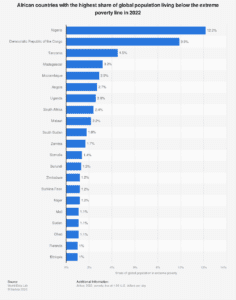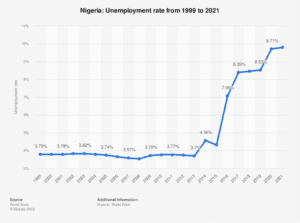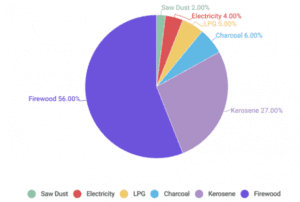The reality that the planet is going through some changes that are attributable to climate change is nothing new. Climate change has recently affected many parts of the world, with carbon dioxide accounting for 76% of all greenhouse gas emissions[1]. The ambition of the Energy Transition is to implement a long-term, sustainable global action-based strategy to regulate and reduce carbon emissions, which are mostly generated by fossil fuels (coal, petroleum, natural gas).
To establish Nigeria’s engagement and commitment to reducing carbon emissions, President Muhammadu Buhari revealed at COP26 that Nigeria aspires to achieve net-zero emissions by 2060. In light of this objective, an energy transition plan[2] for Nigeria was launched.
In 2014, the Nigeria Industrialization plan was launched to restructure and diversify the Nigerian economy through the transformation of Industry groups where we have a comparative advantage – Agro Processing; Metals and Solid Minerals Processing; Oil and Gas related Industries; and Construction, Light Manufacturing, and Services. However, one of the many factors that weighed against the accomplishment of this initiative was the nation’s demand for adequate power generation and supply to drive major operations of these industries. Over time, this strategy was shelved as the constraints imposed by the country’s energy needs deteriorated the situation.
The energy mix of Nigeria (Hydro, Oil, Gas, Solar) is considered to be a major advantageous component in driving the industrialization initiative as the country is blessed with such resources in abundance. Tragically, Nigeria has moved further away from economic prosperity due to its inability to harness and exploit these resources as a springboard to remedy the energy crises.
Developed countries such as the United States of America and Iceland were able to evolve through industrialization by leveraging their resources in which energy exploitation played a key role. Between the mid-19th century and the 21st century, the United States of America exploited an energy mix[4] of coal, oil, natural gas, and nuclear to advance its industries while Iceland exploited geothermal and hydro resources[5]. As crucial industries were reinvented to drive these countries’ economies, the shift in the energy mix (clean energy) would play a significant role in catering to their energy needs while transiting from a fossil fuel-based energy mix.
Nigeria’s energy transition plan is intended to alleviate the country’s energy needs while diminishing its reliance on fossil fuel. Its primary objectives are.
- Lifting 100 million Nigerians out of poverty and driving economic growth
- Bringing modern energy services to the full population.
- Managing the expected long-term job loss in the oil sector due to the reduced global fossil-fuel demand.
- Playing a leadership role for Africa by promoting a fair, inclusive, and equitable energy transition in Africa that will include Gas as a “transitionary fuel”.
- Streamlining existing and new government-related energy transition initiatives.
Whilst the energy transition plan, if implemented successfully, would yield national development and energy prospects, the highlighted objectives, which represent the key goals, are challenged with some realities that raise critical concerns for the plan across board.
Poverty Alleviation and Economic Sustainability
The state of poverty remains intolerable for a nation (Nigeria) with enormous natural resources and an advantageous human capital to sustain trade. As of 2018, poverty slowly increased as a result of population expansion outpacing economic growth. Unemployment peaked at 23.1% and nearly half of the population is said to be living below the international poverty line ($2 per day)[6]. Slow economic growth, lack of investment in human capital, weaknesses in the labor market, and exposure to external shocks are impeding Nigeria’s efforts to reduce poverty which now hovers around 40%[7].
It would undoubtedly be a challenging feat to lift Nigerians out of poverty in this contemporary time since there are numerous hurdles to overcome. In Nigeria, overcoming poverty and building a long-lasting, prosperous economy are hampered by corruption, unemployment, insecurity, poor medical care, the appalling condition of education, underutilization of resources, lack of economic diversity, and political instability. Hence the necessity to approach these problems in a committed and determined manner.


Energy Challenge and Power Development
The inability of Nigeria’s power sector to supply adequate electricity to domestic consumers and industry operators, despite the country’s enormous energy reserves and unexplored resources has in ways crippled livelihood of citizens and the economy at large.
At a one-day workshop for energy reporters and civil society groups organized by the Association of Nigerian Electricity Distributors (ANED) in partnership with McArthur Foundation[8], in August 2022, it was affirmed that Nigeria would need to generate 200,000 Megawatts (mw) of power to satisfy the needs of its 200 million population, and according to international norms, 1,000 MW would be required to sustain a million people. However, 3,500 to 5,000 MW of Nigeria’s 13,000 MW installed generating capacity were accessible for transmission to users. This shows a vast disparity where power generation and distribution are concerned. There is the urgent need to significantly increase investment in the power sector while eradicating all legal and policy bottlenecks to accelerate power generation, improve transmission capacity and enhance distribution to end users, if Nigerians are to effectively transition away from alternative power generation that adds to carbon emissions.
Imported Liquefied Petroleum Gas (cooking gas) makes up for about 65% of the nation’s consumption[9] which translates to the high influence of the international market on price and availability. This has led to the current increase in cooking gas prices, which is a result of destabilization (the Russia-Ukraine war) experienced by importing countries, making this commodity relatively unaffordable for the masses with many compelled to retain their traditional methods of cooking which equally contributes to carbon emissions.
Nigerian Household Energy Mix

Source: National Gas Policy, 2017
Since Nigeria heavily relies on petrol and diesel engines to provide transportation services, the transportation industry consequently plays a significant role in the country’s carbon emissions. An effective approach to successfully reduce this sector’s carbon emissions is to switch over to electric automobiles from combustion-powered ones. Sadly, Nigeria has not made any significant investments in this area over the years, making it harder to transit.
Recommendations
- To considerably diminish the country’s dependence on the oil and gas sector, economic diversification policies should be put into place to boost other industries (agriculture, manufacturing, services) that have the potential to be economic drivers. This will ensure that production activities outweigh consumption needs with significant increase to Nigeria’s GDP.
- Tackling insecurity aggressively is crucial since it has choked down economic activities and blocked capital inflows necessary for investments in key sectors of the economy.
- To combat ineptitude and improper administration of the nation’s resources, the government and other relevant organizations should be unyielding and methodical in their battle against corruption.
- It is critical to develop policies that facilitate the exploration and use of renewable energy resources in order to attract foreign investments, generate revenue over time, and create employment.
The key objectives of Nigeria’s Transition Plan can be accomplished if certain technical policies and frameworks were to be implemented considering the concerns raised. Finally, to guarantee overall cohesion across the nation, all required players, organizations, and bodies should be included at every step of planning and executing Nigeria’s energy transition agenda.
Footnotes
[1] https://www.c2es.org/content/international-emissions/
[2] https://www.energytransition.gov.ng/
[4] https://transportgeography.org/contents/chapter4/transportation-and-energy/energy-sources-evolution/
[5] http://www.hartford-hwp.com/archives/61/266.html
[6] https://en.wikipedia.org/wiki/Poverty_in_Nigeria
[7] https://www.worldbank.org/en/news/press-release/2022/03/21/afw-deep-structural-reforms-guided-by-evidence-are-urgently-needed-to-lift-millions-of-nigerians-out-of-poverty
[8] https://www.thisdaylive.com/index.php/2022/08/12/discos-nigeria-yet-to-generate-up-to-6000mw-electricity-since-independence/
[9] https://punchng.com/cooking-gas-price-jumps-by-240-marketers-halt imports/#:~:text=About%2065%20per%20cent%20of,the%20situation%20is%20not%20addressed.
Join us at PLSI as we continue the journey of fostering public accountability in Nigeria!
Written by:

Kolawole Kolade – Program Officer at PLSI

